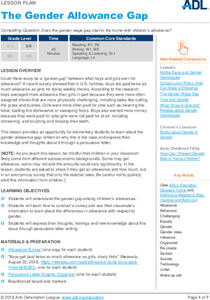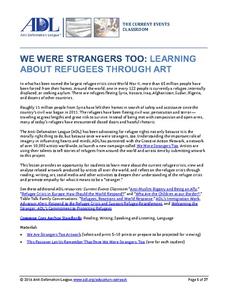Anti-Defamation League
Gossip, Rumors and Identity
A thoughtful discussion prompts middle schoolers to reflect on gossip and rumors, what they are, their experience with them, and how some groups experience it more than others. Scenarios challenge participants to consider the impact of...
Anti-Defamation League
What is the Soul Cap and Why Was it Rejected for Olympic Use?
In 2021 the FINA, the International Swimming Federation, banned using Soul Caps in the Tokyo Olympics. Middle schoolers investigate why the committee made this decision and the resulting backlash, including charges of discrimination and...
Anti-Defamation League
Major League Baseball and the Negro Leagues: Correcting an Injustice
It's been a long time coming! In 2020, MLB Commissioner Robert D. Manifred, Jr. stated that "the Negro Leagues would be recognized as official major leagues." Middle schoolers investigate the history of the Negro Leagues and use evidence...
Anti-Defamation League
Intent vs. Impact: Why Does it Matter?
Contrary to the popular saying, words can hurt. Words matter! Tweens and teens can reflect on how words impact others even if the intent wasn't how the words were perceived. After examining an Instagram post where Lizzo apologized for...
Anti-Defamation League
Microaggressions In Our Lives
Defining, identifying, and learning how to counter microaggression is the lesson's focus for high schoolers. Learners examine a definition of the term, write about their own experiences with microaggression, watch short video examples,...
Anti-Defamation League
Emojis and Me
A activity features the work of O'Plérou Grebet, a graphic designer who created a collection of emojis to represent his life in West Africa. Scholars explore the history and purpose of emojis, then read and discuss an article about...
Anti-Defamation League
Identity and Diversity in My Generation
Gen Z, those born between 1997 and 2012, according to research, is the "most racially and ethnically diverse generation in U.S. history." Gen Z high schoolers are challenged to consider how they identify themselves. They select a photo...
C3 Teachers
Economics of Slavery: How Did Cotton Sow the Seeds of Panic?
An inquiry-based lesson challenges high schoolers to research and identify the economic forces and inventions that impacted the cotton industry. Researchers consider how the use of slavery impacted the economic growth of the United States.
Anti-Defamation League
The Gender Allowance Gap
Does the pay gap begin with allowance? That is the big question scholars answer in a lesson plan examining how gender affects how much money an individual earns. Class members conduct a survey to identify how the allowance is paid, take...
Anti-Defamation League
What "Draw-A-Scientist" Reveals about Gender Stereotypes
What do you picture when you hear the word scientist? Challenge scholars to put pencil to paper, draw a scientist, and then reflect on the patterns they observe. Learners read an article about a female scientist and write a story about a...
C3 Teachers
African American Voices and Reconstruction: What Does It Take To Secure Equality?
High schoolers research the 13th, 14th, and 15th Amendments, as well as other primary source documents, to determine Reconstruction's impact on the North and South. The 34-page inquiry-based lesson includes a staging question and...
Anti-Defamation League
Lonnie Chavis of 'This Is Us' Writes about Racism
Scholars read and discuss an essay by 12-year-old actor Lonnie Chaves about racism, paying close attention to how racism presents itself in interpersonal and institutional ways. Learners reflect on how they experience or witness racism...
Anti-Defamation League
Sneakers and Prejudice: Letters to Challenge Bias
After learning that NBA player Stephen Curry's shoes only come in boys' sizes, Riley wrote a letter sharing her concern, highlighting the gender bias and inviting Curry to take action. Scholars view a news clip, review the letters,...
Anti-Defamation League
Job Roles without Gender Boundaries
A lesson examines gender stereotypes and how they relate to career choices. Small groups look closely at job titles, identify gender bias, and brainstorm ways to add inclusivity. Individuals reflect on their interests and future career...
C3 Teachers
African Americans and the Civil War: How Did African Americans Experience the Civil War?
To understand African Americans' involvement in the United States Civil War, high schoolers gather evidence from primary source images, census reports, and documents. As a summative performance task, individuals craft an argument,...
C3 Teachers
Anna - One Woman’s Quest for Freedom: What Did Freedom Mean for Anna?
The 2018 film Anna, One Woman's Quest for Freedom in Early Washington, D.C., offers high schoolers an opportunity to examine the sacrifices one woman endured to gain her freedom from slavery.
Anti-Defamation League
We Were Strangers Too: Learning About Refugees Through Art
Did you know that "in the largest refugee crisis since World War II, more the 64 million people have been forced from their homes"? The Anti-Defamation League presents an activity that asks class members to examine a series of artworks...
Anti-Defamation League
Social Justice Poetry
Learners gain insight into how songs and poems express feelings of injustice. They also learn about literary devices and types of poems and make a personal connection when they write their own free verse poems about injustice.
Core Knowledge Foundation
The Civil War
A student reader shares information about the history of slavery, the Civil War, President Abraham Lincoln, women's contributions to the war, the Emancipation Proclamation, and reconstruction.
University of Minnesota
Ways of Knowing: Apples as Models
Use apples as a way of thinking about models. Young scientists consider how the word apple, a two-dimensional drawing, a three-dimensional image, a photograph, and plastic apples all model real apples in preparation for developing models...
Core Knowledge Foundation
Early Presidents and Social Reformers
An ebook by Core Knowledge features information about early United Stated presidents such as George Washington and Thomas Jefferson and social reformers such as Sojourner Truth and Frederick Douglas.
C3 Teachers
Reparations: Why Are Reparations Controversial?
To understand why the topic of reparations is controversial, young scholars gather background information by reading articles, watching videos, and examining cases where reparations were made. Learners consider the lasting repercussions...
C3 Teachers
Black Genius: How Did Black Genius Help Build American Democracy?
"How did the slavery system undermine the United States' democratic principles?" This question launches a study of how the Preamble to the Declaration of Independence, Article I, Section 2 of the U.S. Constitution, and Article IV,...
Learning for Justice
The Color of Law: Creating Racially Segregated Communities
It is pointed, powerful, and painful! The first of three lessons about laws and practices that support inequality looks at how government policies created and reinforced segregated communities. Young social scientists read excerpts from...

























